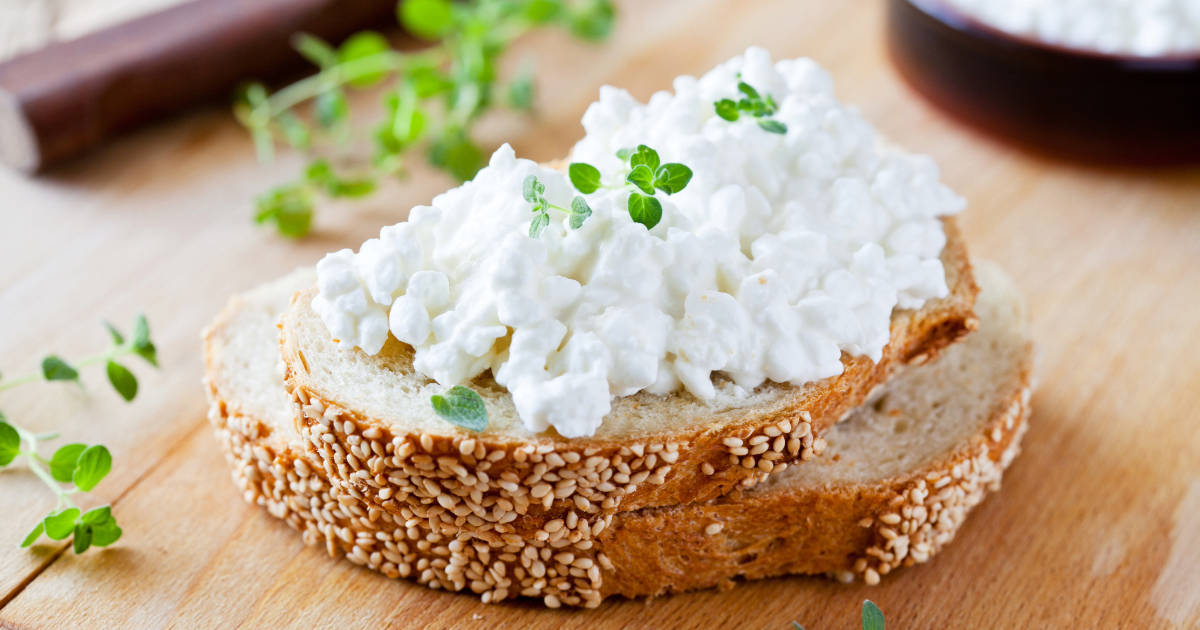Cottage cheese and milk are both nutritious dairy products that offer a variety of health benefits. But how do they compare in terms of calories, protein, fat, carbs, vitamins and minerals?

Cottage cheese and milk have a lot of similarities - they are both made from cow's milk and offer nutrients like calcium, B vitamins and protein. However, there are also some key differences when you compare cottage cheese vs milk.
Calories and Macros
First, let's look at the basic calorie and macronutrient profiles of cottage cheese and milk.
Calories
Per 100 grams:
- Cottage cheese: 98 calories
- Milk: 50 calories
Cottage cheese contains almost double the calories that milk does per 100g serving. The extra calories in cottage cheese come primarily from its higher protein and fat contents.
Protein
Per 100 grams:
- Cottage cheese: 11.1g
- Milk: 3.3g
Cottage cheese absolutely dominates milk when it comes to protein. With over 3 times as much protein per 100g, cottage cheese is an excellent food source to help build and maintain muscle mass.
Fat
Per 100 grams:
- Cottage cheese: 4.3g
- Milk: 0.97g
Cottage cheese contains over 4 times the amount of fat as milk. However, cottage cheese fat is not as bad as some may think - most of it comes from healthy unsaturated dairy fats.
Carbohydrates
Per 100 grams:
- Cottage cheese: 3.4g
- Milk: 4.8g
Milk has slightly more carbs than cottage cheese, although both foods are relatively low carb options. The carbs in milk and cottage cheese come entirely from lactose and milk sugar.
Key Takeaway: Cottage cheese is much higher in protein and fat compared to milk, while milk contains a few more carbs per serving.
Vitamins
Cottage cheese and milk both provide a variety of important vitamins, but the amounts differ between the two.
Vitamin A
- Cottage cheese: 37μg
- Milk: 58μg
Milk contains more vitamin A, providing 58μg per 100g while cottage cheese supplies 37μg. Vitamin A supports healthy vision, bones and immune function.
Vitamin D
- Cottage cheese: 0.1μg (3 IU)
- Milk: 1.2μg (48 IU)
Milk has a much higher vitamin D content than cottage cheese. Vitamin D plays a vital role in absorbing calcium and immune health.
B Vitamins
For B vitamins like riboflavin, vitamin B12, pantothenic acid and vitamin B6, cottage cheese provides higher amounts than milk. However, milk contains more vitamin B1 and B2 per 100g.
Cottage cheese offers greater B vitamin nutrition, with excellent amounts of riboflavin, folate, B12 and other B vitamins. These assist in red blood cell production, growth, brain function and energy metabolism.
Key Takeaway: Milk is richer in vitamins A and D, while cottage cheese provides more B vitamins overall - especially folate, B12, B5 and B6.
Minerals
Minerals like calcium, phosphorus and selenium are abundant in both cottage cheese and milk. But which food offers more?
Calcium
- Cottage cheese: 83mg
- Milk: 120mg
Milk contains 45% more calcium than cottage cheese, with 120mg per serving compared to 83mg in cottage cheese. Calcium is essential for building and protecting healthy bones and teeth.
Phosphorus
- Cottage cheese: 159mg
- Milk: 95mg
Cottage cheese provides a lot more phosphorus, with 67% more per 100g than what milk offers. Phosphorus works with calcium to mineralize bones and teeth.
Selenium
- Cottage cheese: 9.7μg
- Milk: 3.3μg
Cottage cheese contains almost 3 times as much selenium as milk. Selenium acts as an antioxidant to prevent cellular damage from free radicals.
In addition, cottage cheese has more iron while milk contains more magnesium and potassium. For selenium, phosphorus and iron - cottage cheese is the better choice.
Key Takeaway: Milk has the upper hand when it comes to calcium content. But cottage cheese is a superior source of phosphorus, selenium and iron.
Cottage Cheese vs Milk: Which is Healthier?
So when comparing cottage cheese and milk, which one comes out on top in terms of nutritional value?
Cottage cheese is the healthier choice if you are looking to build muscle and strength. With 10g of protein per serving, it absolutely dominates milk for a high protein food. Cottage cheese also contains more B vitamins, selenium, phosphorus and iron.
However, milk still has nutritional strengths over cottage cheese. Milk is superior for bone health, with its abundant calcium and vitamin D content. It also offers slightly more magnesium and potassium.
Therefore, choose cottage cheese if you want a vegetarian protein food that's low carb. Go for milk if you are looking for strong bone nutrients like calcium and vitamin D.
In reality, both offer unique nutritional benefits - so there's no reason you can't enjoy cottage cheese AND milk as part of a healthy diet!
FAQs
Is cottage cheese healthier than milk?
Cottage cheese is healthier overall thanks to its high protein content, B vitamins, selenium, phosphorus and iron. However, milk contains more calcium and vitamin D which better supports bone health.
Is cottage cheese good for you?
Yes, cottage cheese is a very healthy food. It provides high-quality protein to preserve lean muscle mass. The calcium helps strengthen bones too. Cottage cheese is also rich in vitamins B5, B6, B12 and minerals like selenium and phosphorus. Just be mindful of sodium content if you have high blood pressure.
Is cottage cheese better than yogurt?
Cottage cheese beats yogurt hands down for protein - it packs over 20g per serving compared to just 12g in Greek yogurt. However, yogurt tends to be higher in calcium and beneficial probiotics. So cottage cheese wins for protein, while yogurt is better for bone health and gut bacteria.
Conclusion
When comparing cottage cheese vs milk, both foods bring unique nutritional strengths.
Cottage cheese dominates milk any day of the week when you look at protein quality and quantity.
It also contains higher amounts of B vitamins, selenium, phosphorus and iron.

